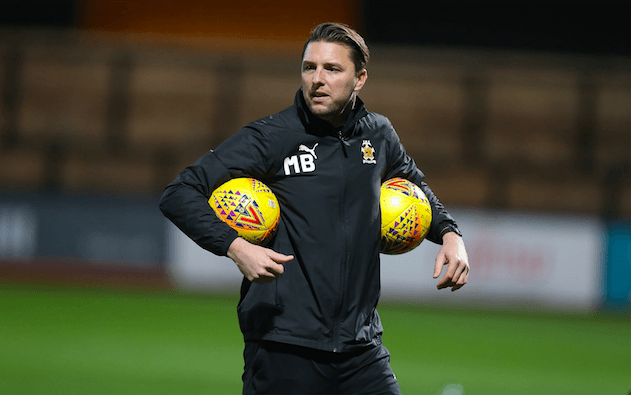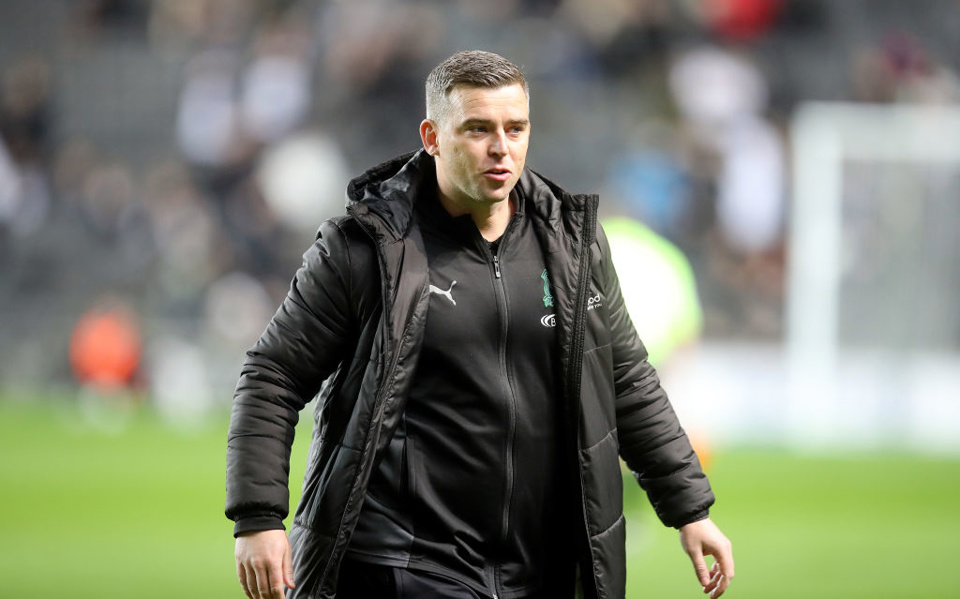League One 2021/22: Top Five Managers of the Season

The standard League One campaign is now complete, so ahead of the eagerly anticipated play-offs we thought it would be an ideal time to reveal our 'Top Five Managers of the Season', courtesy of Football League expert Gab Sutton.
Enjoy!
5. Michael Duff (Cheltenham)
Most of Cheltenham’s greatest achievements in the modern era have had Michael Duff right at the beating heart of it.
It was the fresh-faced Northern Irishman who scored the winner against Yeovil in 1999 to send the Robins into the Football League for the first time, before the defender moved on to Burnley.
And, picking up the pieces after Gary Johnson was unable to convert National League success into League Two with a pair of underwhelming campaigns, Duff has converted Town from the foot of the EFL to midtable in League One in three-and-a-half years.
In fact, the Cotswold club’s 15th-placed finish was the highest in their history – having come two lower under John Ward in 2006-07 – after almost everyone (certainly outside the club and perhaps a majority of the fanbase) predicted either relegation or narrow survival.
The scepticism was understandable, with just three players arriving before August, the month which saw captain and long throw specialist Ben Tozer leave for National League Wrexham.
Defensively, Cheltenham have missed the continuity of the defensive trio they enjoyed in League Two, partly due to injuries to Charlie Raglan and occasionally Will Boyle – shipping 80 goals was far from ideal.
The Robins scored 66 though – four fewer than automatic promotees Rotherham – thanks to the form of Alfie May.
The striker bagged 23 goals for the season, whilst being a nuisance to opposition defenders and being willing to drift wide, drop in and join in with the link-up play.
On top of this, Conor Thomas’ injuries in November and January have seen Duff operate without a recognised sitting midfielder.
When three of Liam Sercombe, Callum Wright, Ellis Chapman, Elliott Bonds and Aaron Ramsey have started, each of them chip in defensively and each of them contribute something going forward.
Bonds might consider himself slightly more destructive than, perhaps, Callum Wright, who is a balletic ball-carrier with a knack for well-timed runs and nine goals for the season, but there is no de facto ball-winner, deep-lying playmaker or number 10.
Instead, the duties of each midfielder tends to overlap with one another, which is why Cheltenham have been able to outmanoeuvre enough opponents to be competitive at this level.
Duff has children at school in Cheltenham and a wife that is settled in what is a rather family-friendly town, although the flip side is that the club may not have the infrastructure or the resources to push on from its current position.
The big question, though, is whether Duff will use his achievements as a springboard to push on for bigger and better opportunities like Dean Smith, who left Walsall for Brentford then moved onto Aston Villa, or go on to stay as a long-serving club icon like John Coleman at Accrington Stanley.
The ideal scenario for Duff may be that the Bristol City job becomes available, and he can make a step up without compromising too much logistically, but otherwise he may stay put.
The 44-year-old is a legend at Cheltenham and may not feel like he is ready to up sticks.

4. Mark Bonner (Cambridge)
Much like Cheltenham, Cambridge were widely tipped to struggle after promotion from League Two – perhaps even more so than the Robins.
They, too, lost a key man to Wrexham, in this case 32-goal top scorer Paul Mullin, while Kyle Knoyle’s exit for Doncaster was also seen as a blow.
Joe Ironside has stepped up to the Mullin mantle magnificently, however, while Sam Smith has at times covered well for the striker when injured, but has played on the right of a front-three for much of the campaign – scoring 15 league goals.
Mark Bonner has demonstrated the ability to adapt to the fresh challenges that have come his way and it’s his pragmatism, flexibility and man management qualities that have been crucial to the success.
The 36-year-old is part of the Yellow and Black Army, he’s worked for the U’s in various capacities for most of his adult life and has an inherent connection to the club, which would make leaving that bit harder.
Plus, Bonner is building something special at Cambridge, he has 16 players under contract for next season including some talent youngsters on top of a reliable core, with Adam May and Jack Iredale being the only key players at risk of leaving on a free – there is a hope the former might stay.
This summer will not require a huge rebuild, and with the structure in place – especially Ben Strang as Sporting Director – Bonner’s job is streamlined somewhat.
And, while Championship clubs like Reading and Birmingham might be interested in a boss who has had the best realistically achievable first two seasons in EFL management, they would be very demanding.
Either role would require not only lifting a disillusioned fanbase, but also working with an imbalanced squad and unqualified directors and tackling deep-rooted structural issues without using them as a free pass for poor performance.
The novelty of managing in the second-tier might shine bright initially, but because Bonner does not have a reputation for being staunch in one particular high-pressing or possession-heavy philosophy, it would likely be for a poorly-run club.
And it may be more enjoyable to be managing a boyhood club, hopefully trying to challenge for a top half finish against the odds in a competitive league and getting showered with praise for achieving that or more, than it would be to start the season in a dogfight and almost fighting a club as well as a division.

3. Steven Schumacher (Plymouth)
When Ryan Lowe left Argyle for Preston North End in December, many predicted a drop-off.
Lowe had led the Devon club to promotion from League Two in 2019-20, to comfortable safety the following season and had initiated a challenge for another promotion this term.
At that point, the temptation might have been to make a noise. Go and get Michael Flynn. See if the compensation money can be re-invested in Michael Duff at Cheltenham, or Rob Edwards at Forest Green.
Instead, Argyle promoted Steven Schumacher to the number one gig, with Lowe’s former assistant taking charge for a draw at MK Dons the following night.
The transition felt seamless, as though the scenario of Lowe departing and Schumacher staying on to be manager had been strategized before it happened, which is really the mark of great planning.
Schumacher has benefited from the leadership of chairman Simon Hallett and Chief Executive Andrew Parkinson, but he has also done incredibly well to keep the promotion push going.
Argyle have taken 44 points from 26 games under the new boss to move onto 80 points, a tally with which they have been incredibly unlucky to miss out on the Play-Offs: not since 2002-03 has that return not been enough for a top six berth.
It is a cruel twist of fate that what the Devoners have amassed is not enough, but that doesn’t mean Schumacher has not done a fantastic job to continue what his predecessor started.
And while League One will be extremely competitive next season, Argyle have strong foundations: a top-notch goalkeeper, a solid defence, a fluid left side, a core of reliable grafters and a crop of appealing strikers
While Schumacher stays, they look well-placed to challenge again: and when ‘Schuey’ goes, perhaps Kevin Nancekivell will take them up!

2. Liam Manning (MK Dons)
On the one hand, Liam Manning benefited from the work of his predecessor at MK Dons.
Russ Martin and Luke Williams had drilled into the players an extreme, possession-heavy 3-4-2-1 identity with a box midfield, with emphasis on creating a high-volume of half-chances.
Those principles have made it easier for Manning to turn MK into promotion contenders, but the job has been far from straightforward.
When he first came in, the club had been left in the lurch by Russ Martin, who along with Williams departed for Swansea after the first competitive match of the season.
Although Manning has not had a pre-season to work with his squad, he has still been able to put his stamp on the team without disrupting the synergy of a group that had been bubbling away nicely under his predecessor.
MK Dons are still a patient, possession side, but there has been an added element of verticality under Manning, more emphasis on ball-carrying, more pragmatism and a greater capacity to win ugly.
In 2020-21, MK Dons were the better side in most of their games, but on the occasions they played badly it tended to be a complete no-show and they would invariably lose.
Under Manning, MK are better at keeping the solidity when the football is not flowing, they have been able to win big games with 10-men like at Sunderland and can grind out results, thanks to the form of Warren O’Hora and Harry Darling at the back.
Manning has been linked with big jobs like QPR and Watford, but it’s a division he could well be working in with his current employers.
Although the final day 5-0 victory at Plymouth Argyle was not enough for automatic promotion due to victories elsewhere for Rotherham and Wigan, MK Dons go into the Play-Off Semi-Final with Wycombe full of belief.

1. Leam Richardson (Wigan)
The most impressive aspect of Leam Richardson’s work at Wigan is that he has done two very different jobs, both brilliantly.
2020-21 was a case of firefighting as the club faced grave uncertainty due to financial woes, operating with a skeleton staff, with all their half-decent players pinched in a fire sale.
In those circumstances, Richardson had to cultivate a kind of Dunkirk spirit and harness a sense of togetherness to keep the ‘Tics afloat, on the field and off it.
The takeover of Talal Al Hammad made the young manager’s job easier, because of the fresh investment, the new appointments across the club to streamline his workload and the quality brought in.
Despite this, many assumed that Wigan would struggle to go from battling relegation one season to competing for promotion the next and that a transitional top half campaign may be required.
Instead, the West Lancashire club have claimed top spot, despite the circumstances surrounding Charlie Wyke.
The key striker collapsed in a training session and may not be alive today were it not for the heroics of Richardson (and Jonathan Tobin – the same person who saved Fabrice Muamba’s life back in 2012).
As well as handling Wyke’s absence from a footballing perspective, which was done well thanks to the form of Josh Magennis and others, there was also the emotional aspect.
Wigan have been solid all season, especially with Jack Whatmough defying previous injury issues to command at the back, and with Tom Naylor bringing tenacity in midfield with Will Keane and Callum Lang combining brilliantly in attack.
While the improved structure has helped Richardson, nobody anticipated an overnight transformation, so the fact they have won the title suggests the man who was the understudy to Paul Cook for so long can now claim the credit as a number one.
Richardson is not interested in personal accolades, though: as soon as the title was won, his thoughts went straight to the people who had been affected by the club’s previous troubles and dedicated the success to the Wigan community.


